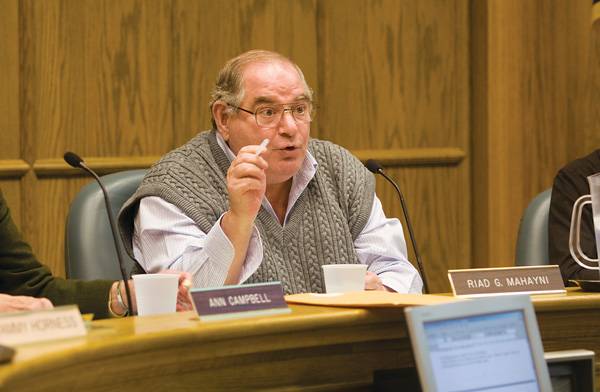Extended Section 8 background checks rejected

City Council member Riad Mahayni speaks out about how the potential background checks for Section 8 lead into racial injustice during the meeting yesterday at the Ames City Council Chambers. The City Council voted against incorporating the background checks. Photo: Valerie Allen/Iowa State Daily
January 27, 2009
The Ames City Council voted Tuesday to keep the current criminal background check procedures for Section 8 housing applicants.
The motion passed 5-1, following several emotional statements from the public in opposition to national background checks.
“You cannot predict when someone’s going to commit a crime. We can try and stop it, we can do the background checks, but when the background checks don’t work and they don’t prevent crime from coming to Ames, what’s going to be next?” said Robert Knight, , pastor of New Birth Baptist Church.
Knight said the majority of his church’s congregation are black people, and that fear and stereotyping were the major driving forces behind recent concerns about Section 8 housing participants. He said though national background checks might bring about some positive outcomes. Knight said he fears the direction these precautionary efforts could be headed.
“Am I going to be walking down the street, and they’re going to say, ‘There’s an African-American — stop him and see if he’s committing any crime’? Do you hear what I’m saying? We’re stopping people because of the color of their skin instead of the content of their character,” Knight said.
Councilman Riad Mahayni, professor of community and regional planning, said he empathized with Knight, because he and his children had also experienced stereotyping and discrimination because of their race. He said he agreed that the issue was due to some Ames citizens’ stereotyping of the black population.
“I don’t think this was a good moment for the city of Ames, and I think we owe an apology to that segment of our population. This is not a good moment for me,” Mahayni said.
Another group against the national background checks was made up of representatives of human services agencies who were concerned about some of the elderly and handicapped recipients of Section 8 assistance.
Cari McPartland, outreach services coordinator at Richmond Center Community Mental Health Services, said that putting mentally ill people through background checks that include fingerprinting may cause unintended side effects.
“Fingerprinting these citizens could easily contribute to the exacerbation of symptoms, relapse in their illness and, at worst case scenario, hospitalizations,” McPartland said.
McPartland and three other Story County human services representatives issued a signed statement of opposition to the background checks, saying the current procedures provided enough security.
Matthew Goodman was the only Council member in favor of the national background checks, and said it was because he felt the current system treats applicants from out-of-state differently than applicants from Iowa.
The current procedure requires applicants to undergo a criminal background check that includes information from the state of Iowa, so applicants from other states might not be screened for crimes they committed there.
Goodman said he agreed that Section 8 housing has no adverse effect on community safety, and that anyone who makes those claims does so “out of fear and ignorance rather than rational thought.”
A presentation by the Ames Housing Authority revealed that black people currently make up 28 percent of Section 8 recipients. They also reported that since 2004 there have been 20 cases when Section 8 assistance was terminated due to criminal activity.
In other news, the Council received public input on the 2009-2014 Capital Improvements Plan and heard several citizens in opposition to the proposed $50,000 demolition of Carr Pool.
The Council also reviewed the city’s snow removal procedures upon receiving numerous complaints from Ames residents.
Much of the discussion revolved around property owners who did not follow the Municipal Code requirement to clear their sidewalks within 10 daylight hours after snowfall.






